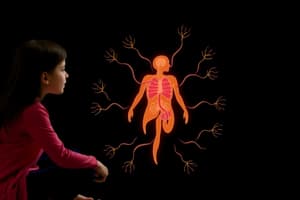Podcast
Questions and Answers
What neurotransmitters contribute to mood fluctuations experienced by teenagers?
What neurotransmitters contribute to mood fluctuations experienced by teenagers?
- Dopamine, serotonin, and norepinephrine (correct)
- Histamine, melatonin, and adrenaline
- Glutamate, GABA, and Acetylcholine
- Endorphins, oxytocin, and cortisol
At what age do growth plates typically close in boys?
At what age do growth plates typically close in boys?
- 20
- 16
- 22
- 18 (correct)
Why is understanding responsible sexual behaviors crucial during adolescence?
Why is understanding responsible sexual behaviors crucial during adolescence?
- To improve academic performance
- To make informed decisions regarding sexual health (correct)
- To maintain healthy friendships
- To enhance physical strength
Which system experiences profound transformations during adolescence?
Which system experiences profound transformations during adolescence?
What marks the physical stability characteristic of adults?
What marks the physical stability characteristic of adults?
Which age range typically marks the beginning of puberty?
Which age range typically marks the beginning of puberty?
What contributes to the noticeable alterations in appearance during puberty?
What contributes to the noticeable alterations in appearance during puberty?
Why is learning about contraception and consent important during adolescence?
Why is learning about contraception and consent important during adolescence?
What is responsible for decision-making and emotional regulation in adolescents?
What is responsible for decision-making and emotional regulation in adolescents?
What aspect of biological changes in adolescence is essential for comprehending the complexities of growing up?
What aspect of biological changes in adolescence is essential for comprehending the complexities of growing up?
Flashcards are hidden until you start studying
Study Notes
Navigating Biological Changes Through Adolescence
Biology shapes our experiences during adolescence through profound transformations in emotions, physique, sexual development, and cognitive abilities. These shifts occur alongside the maturation of the brain and the endocrine system—processes essential to understanding the complexities of growing up.
Emotional Changes
Adolescence brings heightened sensitivity to emotions due mainly to changes in the prefrontal cortex, which governs decision making and emotional regulation. Neurotransmitters such as dopamine, serotonin, and norepinephrine contribute to mood fluctuations experienced by teenagers.
Physical Changes
From growth spurts and acne to voice deepening and menstruation, puberty usher in noticeable alterations to the body and appearance. Pubertal development occurs according to genetic influences, hormonal transitions, nutrition, and sleep patterns. Growth plates close around age 16 in girls and 18 in boys, signaling the physical stability characteristic of adults.
Sexual Education
Understanding reproductive systems and responsible sexual behaviors becomes increasingly vital during adolescence. Learning about sexually transmitted diseases, contraception, consent, and healthy relationships empowers teens to make informed decisions regarding their sexual health.
Puberty and Adolescence
Although typically beginning between eight and thirteen years of age, puberty extends until adolescence ends around age twenty. During this prolonged period, various hormones stimulate physical and behavioral changes, setting the stage for self-awareness and independence. The duration and intensity of these processes vary among individuals depending on genetics, culture, gender, and socioeconomic factors.
As adolescents grapple with these dynamics, parents, educators, and healthcare professionals play critical roles supporting their mental, emotional, and physical wellbeing throughout this phase of transition.
Studying That Suits You
Use AI to generate personalized quizzes and flashcards to suit your learning preferences.




